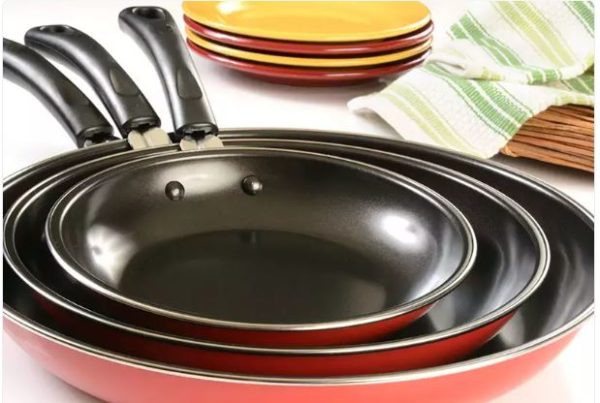1. Avoid using cooking spray
When you apply cooking spray on the pre-heated pan, it sticks to the surface and later it becomes difficult to remove and as the non-stick coatings are fragile, it might cause damages.
2. Heat them correctly
In general, non-stick pans are apt for low or medium heat. Using them for high heat cooking might damage the coating and adulterate the food. To check the correct temperature, you can apply the butter test, according to which if bubble appears, the pan is correctly heated and if the butter turns brown, you need to lower the heat.
3. Season with cooking oil
When using the non-stick pans for the first time, wash them with running water, wipe-off and season them with cooking oil. Then heat for a minute and wipe off the oil content with a paper towel. This act removes all sorts of manufacturing residue and makes the pan fit for cooking.
4. Clean them right
First of all, wash the pan with a soft sponge and soap liquid using warm water. In order to remove any burnt oil spot, use a mixture of baking soda and water. After every cleaning, soak a paper towel in vegetable oil and use it to polish the pan, this act increases the lifespan.
5. Dry after every use
If the company claims to be dishwasher safe, still avoid it at all costs. Also, after every use, wash the pan (as guided above) and dry with a soft cloth to prevent rust formation.
6. Avoid cooking acidic food
The non-stick coating is very fragile and food items like tomatoes and lemon, that are highly acidic in nature, when heated may result in peeling off the non-stick coat. Avoid cooking all sorts of acidic foods to increase the shelf life of pans.
7. Store them properly
Always keep the pans in hanging position and try to have plenty of space in between so that they don’t cling to other utensils. Also, keep them away from sharper objects to avoid any damage to the non-stick coating.
8. Never store food in the pan
Non-stick pans are meant for shallow cooking and not for storing the food. Storing food for long hours in the non-stick pan might cause degradation to the pan and food too.
9. Allow to cool down before washing
The sudden change of temperature could wrap the pan permanently and make it unfit for future cooking.
10. Avoid metal cooking spoons
While cooking in non-stick pans, avoid using sharp and heavy objects like metal spoons and knives. The best ones for non-stick are wooden, plastic or silicone.







